Michelle Bachelet’s Xinjiang report, which was presented a month ago, should have resulted in substantial consequences. After all, it provided detailed circumstantial evidence pointing to “crimes against humanity” by the Chinese government. But the UN Human Rights Council is divided. In the best scenario, the Council will next week decide on an in-depth debate on the report for 2023.
But at least, if this motion is adopted, the way could be paved for the first resolution against China in the history of the Human Rights Council. If the motion fails, China would have weathered the first storm of worldwide outrage after the UN indictment – at least at the UN level. But the initiators remain confident, Marcel Grzanna has learned.
It is practically certain that Xi Jinping will remain the head of state after the CP Congress. But what about his entourage? The candidates for a generational change in the Party are already in the starting blocks. Top positions such as Vice President and Prime Minister will have to be filled. The big question in the fight for the top positions is: Are only Xi allies next in line, or will he have to make compromises with other factions? Read more about the top candidates and a potential future successor to Xi Jinping after his third term in office in Christiane Kuehl’s analysis.
Shortly before the CP Congress, the reins are also being tightened once again in the art and culture industry. Even though the elections in China are not democratic, the government pays close attention to the messages that make the rounds before important political events. And so, a movie that was initially praised by the state media as a “homage to simple country life” fell victim to the censorship authorities this week. “Return to Dust” by director Li Ruijun, which has also been celebrated in Europe, gives a true-to-life description of life in China’s countryside – and thus of the longing of the local population for a better life. However, since Xi has already “defeated extreme poverty” in China at the beginning of 2021, nothing to the contrary can be allowed on the big screen.

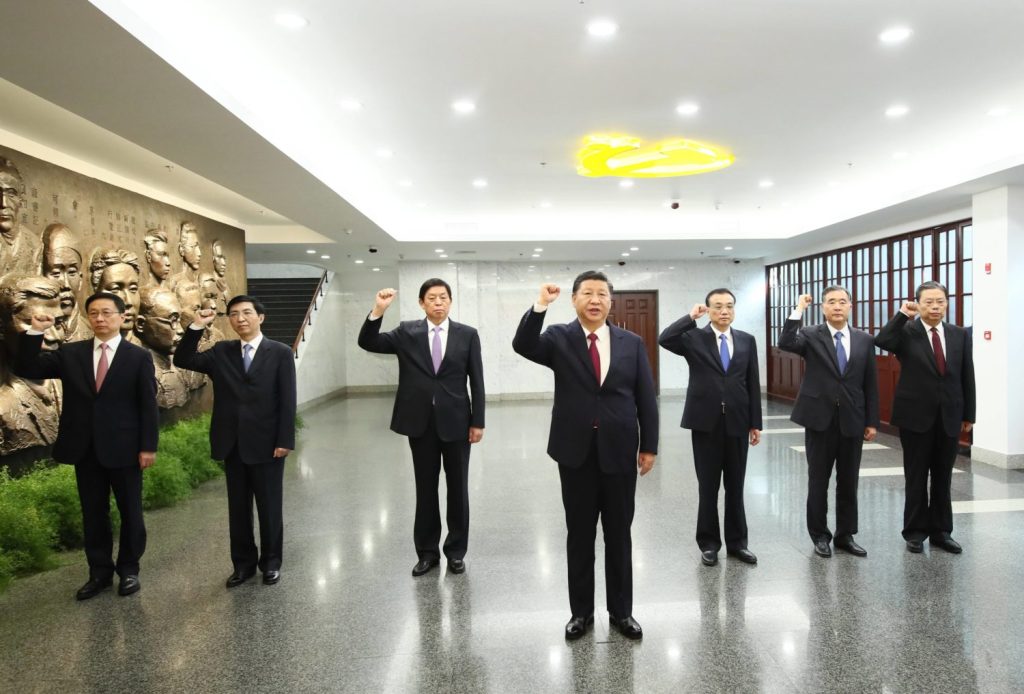
Who are Wang Yang, Wang Huning, Hu Chunhua or Chen Min’er? Never heard of them? That may be because China’s political system currently revolves mainly around Xi Jinping – state and party leader for the last ten years and who knows, maybe the next ten or more. The four mentioned above rank among the most promising contenders for top posts in the Communist Party after the congress on October 16. Xi may have passed both the unofficial age limit and the unofficial two-term limit for party posts. But these are only unofficial, after all, and so it is considered certain that the CP congress delegates will grant Xi a third term. Whether other top cadres in Xi’s entourage will keep their seats, however, is far less clear.
Observers generally expect a generational change from the Central Committee upward. This change has already taken place in the party organs of the provinces and municipalities. But who will take which post is more unclear to outsiders than it has been for a long time. Sinologist Klaus Muehlhahn, President of Zeppelin University in Friedrichshafen, suspects that there has been fierce trench warfare within the party over the various posts (China.Table reported).
The 69-year-old Xi heads the Politburo Standing Committee, the CP’s closest power circle. The others are currently – in hierarchical order – Premier Li Keqiang (67), chief of the National People’s Congress (NPC) Li Zhanshu (72), Political Consultative Conference Chairman Wang Yang (67), ideology czar Wang Huning (67), Central Commission for Discipline Inspection Head Zhao Leji (65) and Vice Premier Han Zheng (68). They all belong to the so-called Fifth Generation of the CP.
According to the unofficial “seven up, eight down” rule (七上八下), only cadres who are 67 years old and younger at the time of the CP congress may remain in office. After 68 they have to retire. Actually, Li Zhanshu and Han Zheng would have to leave the Standing Committee alongside Xi. Since he will remain in office, two top positions will be up for grabs. Half of the members of the 25-member Politburo are likely to be replaced.
The big question: Will only Xi’s allies have a chance, or does the strongman have to make compromises with other factions? Xi has only recently cleaned up the security apparatus with the help of a wave of indictments, mainly for corruption, and filled the vacant posts with loyal followers (China.Table reported) – an ominous sign.
The party congress appointments also provide clues to the changes in state offices to be determined at the NPC in March 2023. In particular, the vice president, the prime minister, and his deputy are to be newly appointed. Premier Li Keqiang stressed in March that he is now serving his last year in office. It is also certain that Vice President Wang Qishan will retire in March 2023 – he is over 70. No clear favorites are known for either post.
Xi could, according to some observers, appoint his confidant and experienced economic policymaker Liu He as vice president. Liu, a Harvard-educated economist, headed, among other things, the negotiations in the trade war with the United States. He is considered the brains behind many economic reforms. The problem: Liu is already 70 years old (born in 1952). But who knows? Wang Qishan was also 69 when Xi appointed him vice president in 2017 – from the position of vice premier, as would be the case with Liu He now.
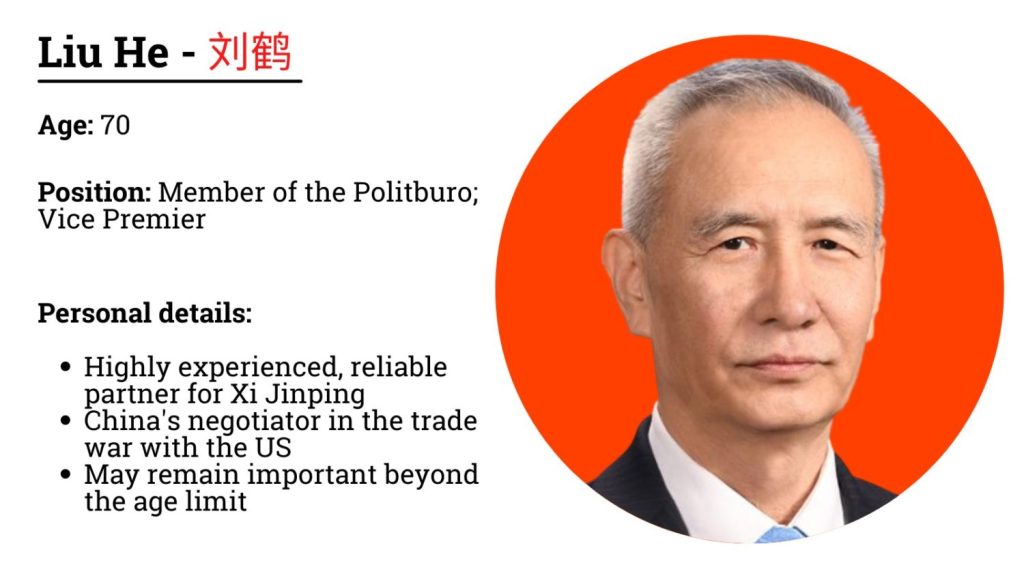
Under Xi’s predecessors, the vice president has also been the crown prince for the succession of the leader: Xi himself served as vice president to his predecessor Hu Jintao. Liu He as vice president would therefore be a sign that Xi is in no way thinking about retiring, not even after 2027. Meanwhile, a younger candidate for the job does not really stand out. So we will have to wait and see.
If Xi followed the rules, Premier Li Keqiang would be allowed to stay on the Standing Committee and he himself would not. Instead, it is the other way around. But who will succeed Li as premier to rescue China’s stumbling economy? Two top candidates are Wang Yang and Vice Premier Hu Chunhua. Both Wang and Hu have led the boom province of Guangdong as party chiefs and are considered comparatively pragmatic, reform-minded politicians. Both fulfill the key requirement of (previously) serving as vice-premier. Hu is now, Wang was from 2013 to 2018.
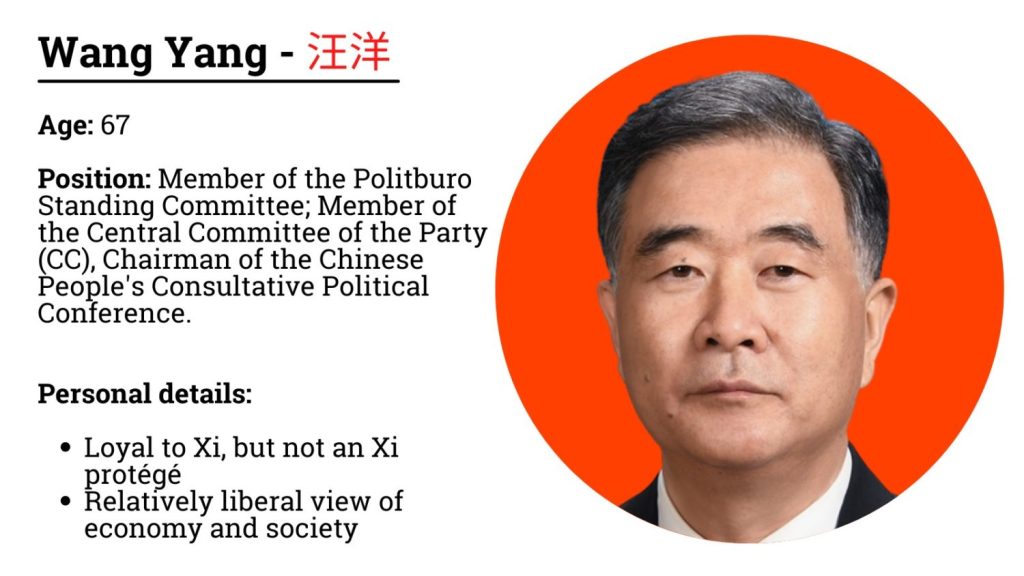
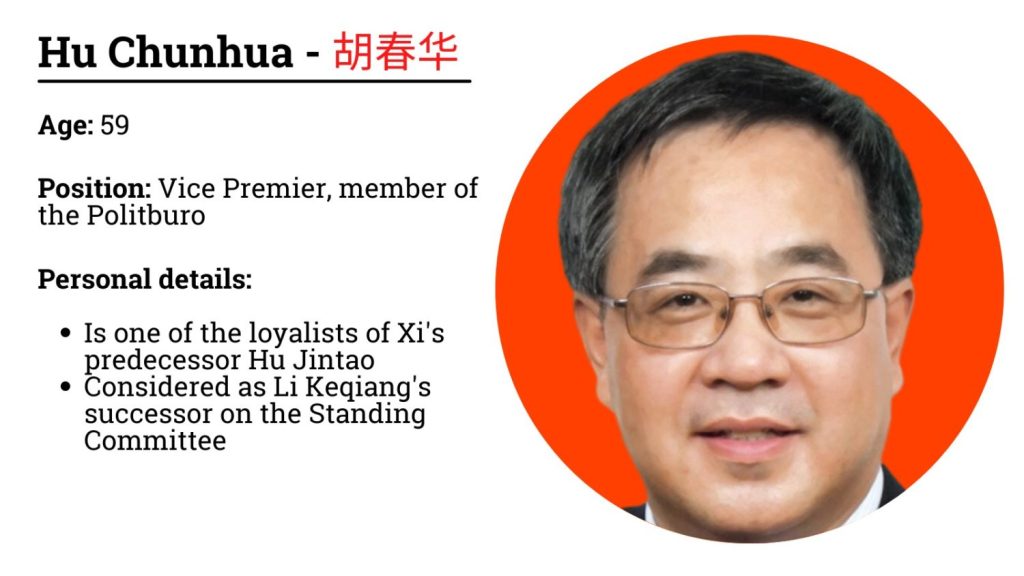
If either of them gets the post, it would be a clear sign that Xi cannot push through all personnel decisions. After all, like Li Keqiang and Xi’s own predecessor Hu Jintao, both belong to the so-called Youth League faction of the CP – which is not said to consist of staunch Xi loyalists, even though Wang Yang, according to a report in the Japanese newspaper Nikkei Asia, has lately been emphatically pro-Xi. Either way, their scope for major change could be limited under the more state-driven “Xiconomics” model, political insiders told Reuters.
Other possible candidates for the post of prime minister are the party leader of Chongqing, Chen Min’er, and his Shanghai counterpart Li Qiang. Both are considered Xi loyalists. Li Qiang was Xi’s secretary for three years when Xi was party chief in the province of Zhejiang. But it is unclear whether he will politically survive the chaos of the Shanghai Covid lockdown.
There are also several candidates for the two likely vacant seats on the Standing Committee, all of them male. “Several 6G leaders — for example, Director of the CCP General Office Ding Xuexiang (1962), Vice Premier Hu Chunhua (1963), and Chongqing Party Secretary Chen Min’er (1960) — will be top contenders for the seven-member Politburo Standing Committee (PSC),” expects Cheng Li, Director of the Brookings Institution’s John L. Thornton China Center in Washington.
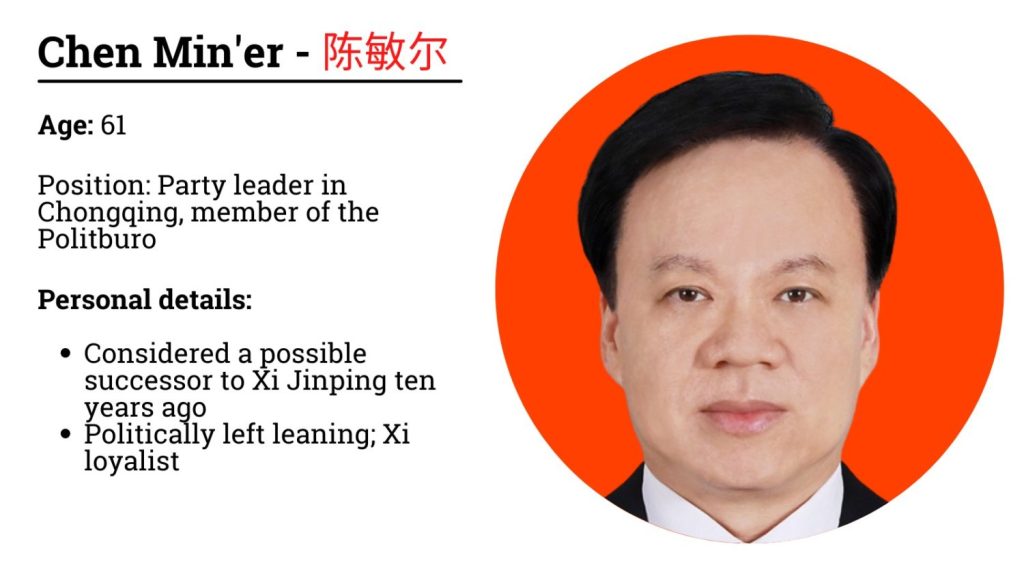
Ding and Chen are Xi protégés. Shanghai’s Li Qiang, as well as party leader Cai Qi, are also repeatedly mentioned. If he moves up, Hu Chunhua could be the only one on the Standing Committee who is not one of Xi’s henchmen.
There is also room for rising the ranks within the Standing Committee. For example, Xi’s confidant Wang Huning is considered a candidate for a higher calling. As head of the Central Secretariat, he is in charge of ideology. Since the higher-ranking NPC Chief Li Zhanshu is likely to retire, Wang would be in line for his post – or for the chairmanship of the Consultative Conference.
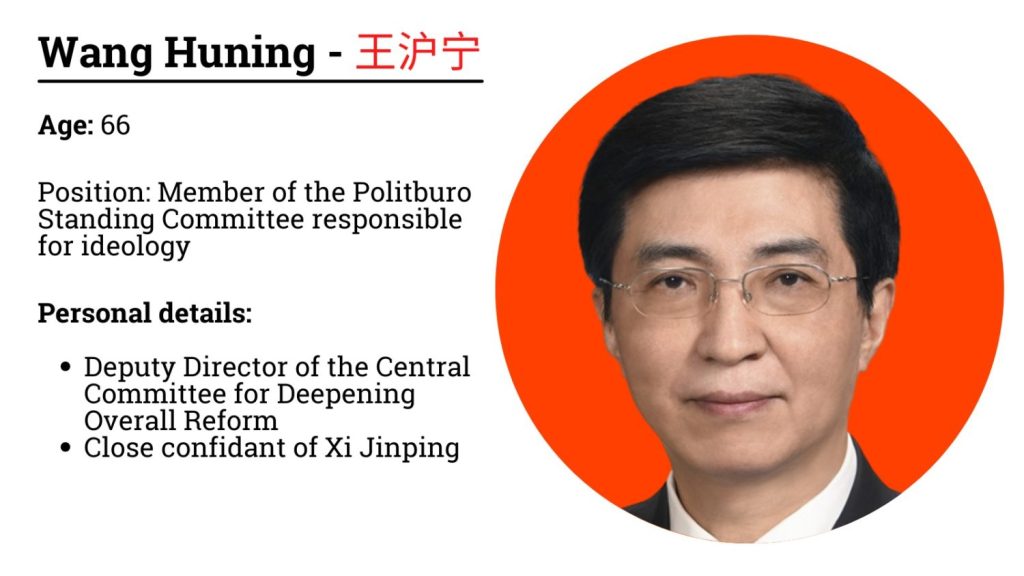
Meanwhile, a successor for Xi is not in sight. Ten years ago, Chen Min’er had been considered a possible successor. But if Xi remains in office for another ten years, 59-year-old Chen will end up being too old for that. Xi will “effectively rule China for another 10-15 years,” believes Yang Zhang, a CP expert and sociologist at American University in Washington. “For now, he does not need to appoint a successor, and nobody dares to propose one. His future successor is now a middle-rank official.” Perhaps China observers should start keeping an eye on the seventh generation.
This Wednesday morning, the proponents of document A/HRC/51/L.6 will meet for a final informal consultation. In Room XXI/Webex at the United Nations in Geneva, the UK has invited the existing signatories to a draft decision that is considered a litmus test of the balance of power in the Human Rights Council. The main question is: Is the UN body in principle willing to take action following last month’s Xinjiang report by High Commissioner Bachelet?
In theory, nothing seems more logical than that. After all, the report gave detailed proof and circumstantial evidence pointing to “crimes against humanity.” But in practice, the Human Rights Council is divided on whether torture, forced labor, and internment of millions of Uyghurs in Xinjiang is a purely Chinese issue.
The paper that addresses this issue falls short of calling for concrete action. Instead, it formulates a decision “to hold a debate on the situation of human rights in the Xinjiang Uyghur Autonomous region, at its fifty-second session under Item 2.” The 52nd session begins in February 2023, and proponents of the paper are trying to buy time to win a possible vote on tangible consequences.
The affected Uyghurs, human rights organizations and members of the independent expert commission had already hoped for a resolution. “Now this report is up-to-date. That is why now there is the greatest chance that decisions will be made that can immediately help the Uyghurs in Xinjiang,” said Zumretay Arkin, who traveled to Geneva as a spokesperson and lobbyist for the World Uyghur Congress (WUC).
But the initiators stress that they want to avoid an escalation in the Council at this point and instead give all member countries time to deal closely with the UN report. The report was published less than two weeks before the start of the 51st session. So there will definitely be no decision on possible consequences of the Xinjiang report before next year.
A so-called China mechanism is being discussed. This would involve the appointment of a special UN rapporteur for human rights crimes in the People’s Republic of China. To date, there are eleven of these, for example for Syria, Afghanistan, North Korea and Eritrea. In addition, there are 44 thematic areas covered by special rapporteurs, but they are not limited to specific countries.
The High Commissioner’s Office also recognizes that the time is right. Last week, the acting head of the High Commission, Nada Al-Nashif, reportedly emphasized in a conversation with a delegation of the visiting Human Rights Committee in the German Bundestag that she considers decisive action by the international community to be imperative. However, Al-Nashif is only in office on an interim basis after her predecessor, Michelle Bachelet, decided at relatively short notice that she would not be available for another term. Her designated successor, Volker Tuerk, will not take up his post until mid-October.
In a statement, the EU joined the call “reporting to the Human Rights Council to closely monitor, report, and assess the human rights situation.” The latest documents confirmed the severity of the human rights situation in China, particularly in Xinjiang, Tibet and Inner Mongolia, the EU representation said.
A vote on the requested decision will be held next Thursday at the earliest, before the session closes after four weeks on October 7. If the motion is adopted, the 52nd session could see the People’s Republic of China become part of a human rights resolution as a member of the UN Security Council for the first time in the body’s 16-year history.
Should the motion fail, the People’s Republic would have weathered the first storm of worldwide outrage after the UN indictment without any repercussions – at least at the UN level. It would still be up to national governments and parliaments, but also the EU, to draw political consequences. However, confidence is high that the decision will be passed by the Council, otherwise, it would not be tabled, a European diplomat told China.Table.
As the second-largest economy, China has been increasingly gaining influence over individual nations and their voting behavior in UN bodies. In Geneva, too, negotiations have been going on behind the scenes since the beginning of the session to organize majorities, it is said. Germany is also part of the Council and is considered a supporter of the motion. However, neither Germany nor, for example, France have so far signed the motion for a decision as of Tuesday evening. A corresponding request to the German representation in Geneva remained unanswered for the time being.
Apart from the United Kingdom and the United States, only Canada, Denmark, Finland, Iceland, Norway and Sweden signed the document. However, the list is still open up to and including today. “We will continue to hold the PRC to account and call on the PRC to release those unjustly detained, account for those disappeared, and allow independent investigators full and unhindered access to Xinjiang,” the US said.
The US government officially labels human rights crimes in Xinjiang as genocide. According to UN conventions, an obligation under international law ensues. This was pointed out by former judge Sir Geoffrey Nice, who presided over the independent Uyghur tribunal in the UK between 2020 and the end of 2021. “The International Court of Justice says that recognition of genocide must be followed by immediate action to stop the crimes. The Americans could do much more,” Nice said at a press conference in Geneva the previous week.
For the general debate of the 51st session last Monday, the People’s Republic had flown in no less than three officials from Xinjiang to speak to the Council, despite all zero-Covid measures. Several members of the Council sounded the same horn. Malaysia, Indonesia or India, for example, supported China’s position and strongly conveyed that a possible approval of application A/HRC/51/L.6 will be a razor-thin affair at best.

The fact that “Return to Dust” (隐入尘烟) would ever be shown on China’S big screens at all is already a small miracle. The heavy movie, which tells the unconventional love story between an impoverished farmer and a woman with a physical disability, has all the characteristics that scare off mainstream audiences in the People’s Republic and call the censorship authorities to action: a low budget, static camera angles and a social critique that is hard to take in.
What was less surprising was that the work by director Li Ruijun initially wowed international cineastes, including during its world premiere at the Berlinale in February. But contrary to all predictions, “Return to Dust” also became a hit with the Chinese audience, where commercial blockbusters and propaganda usually dominate: By mid-September, the film had already grossed over ¥100 million, the equivalent of almost €15 million.
But then the censors got nervous: First, they pulled Return to Dust from the official cinema program. And as if that had not been enough, they pulled the movie from all streaming services on Monday – without any explanation. This is especially cynical considering that the movie itself was once rewarded by the “People’s Newspaper” – after all, the official organ of the Communist Party – with a favorable review and praised as a “homage to simple country life“.
And it was precisely this documentary authenticity that struck a chord with Chinese cinema audiences. Director Li made his entire cast work on a farm in the northwestern Chinese wilderness of Gansu for an entire year in order to learn the local dialects, the economically backward everyday life and the harsh climate. Anything else, the director said in an interview a few months ago, would have felt like a betrayal of the community in which he himself grew up.
The 39-year-old knows poverty first-hand. His home village was not even connected to the power grid until the 1990s. But with electricity came a passion for TV movies, which fueled his desire to escape the barren landscape of China’s northwest.
And because his artistic talent was recognized early on, Li actually landed a traineeship at the National Broadcasting Authority in Beijing, where young Li was suddenly confronted with a completely new world. He downright absorbed the movies of the French “Nouvelle Vague” and fell in love with the “Neorealism” of Italian directors. One particular masterpiece by Vittorio de Sica would leave a lasting impression on him: “Bicycle Thieves” from 1948, which was filmed in the streets of Rome, told the story of ordinary people, and partly had no professional actors.
Li adapted this method for his own films, all of which tell of the troubles and hardships, but also the desires and passions, of ordinary people.
That his artistic voice is now silenced in his homeland saddens many Chinese. “It’s a real shame,” says one user on the online platform Weibo. Another writes resignedly: “That such a sensitive movie can simply be deleted…. It seems as if there really is no hope left here.” Carlo Chatrian, Artistic Director of the Berlinale, also expressed his disappointment about the censorship measure on Twitter.
But in the Chinese government’s bizarre logic, this move is quite consistent. President Xi Jinping presents himself as a man of the people who is committed to fighting poverty in the provinces. At the same time, however, he demands that his people see as little as possible of these social problems. According to Xi, the arts should spread “positive energies” and “harmonize” the people. The official state narrative considers “extreme poverty” in China “defeated” since the beginning of 2021, all thanks to government measures. Consequently, it is not allowed to be portrayed in works such as Return to Dust.
How little respect the censorship authorities have for artistic freedom already became apparent several months ago: Because even before “Return to Dust” was completely banned, they had already altered the film’s depressing ending into a classic “happy ending”. A text added to the end credits stated that the impoverished protagonist managed – with the help of the government – to move from his run-down farmhouse into a modern apartment. Fabian Kretschmer
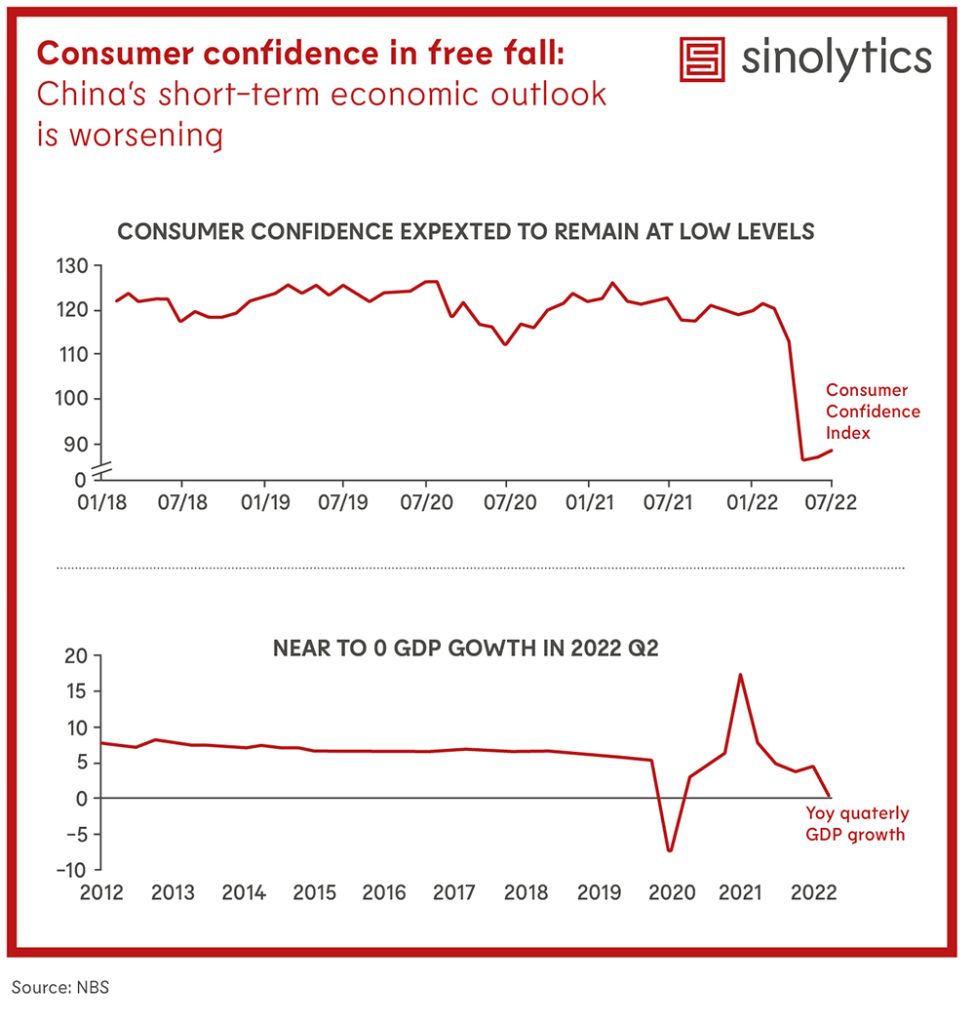
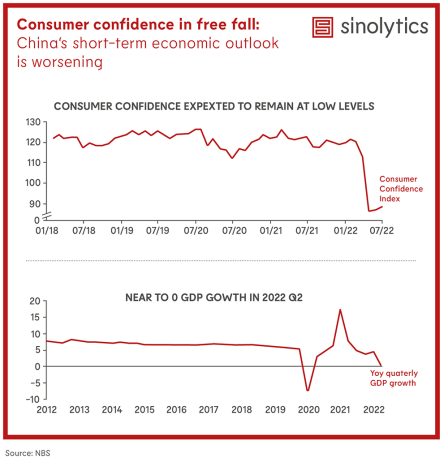
Sinolytics is a European research-based consultancy entirely focused on China. It advises European companies on their strategic orientation and concrete business activities in the People’s Republic.
Beijing has extended the exemption from the purchase tax for EVs. The tax exemption will also apply for the entire year 2023, the government recently announced. The date of purchase will be based on the date of issuance of valid documents for the vehicle. As is already the case, the exemption is to apply to battery-powered electric cars, plug-in hybrids as well as fuel cell vehicles. The models are included in a catalog published by the IT Ministry. The tax exemption will automatically continue in 2023 for cars included in this catalog before December 31, 2022.
Normally, car purchases are subject to a purchase tax of ten percent of the price, but currently only five percent thanks to an economic stimulus package. EVs were exempt – a subsidy that was supposed to expire in 2021.
But China’s economy is flagging, and EVs are needed to boost China’s overall ailing car market. In August, more than 600,000 NEVs were sold for the first time: Battery-powered EVs accounted for by far the largest share, with 490,000 models sold. “Compared to July 2022, 632,000 electric cars sold represent an increase of around twelve percent, and compared to the same month last year, sales of NEV passenger cars more than doubled (+108%),” the news service Electrive wrote. ck
Troubled real estate developer Evergrande is working with the Shenzhen government to finish several construction projects in the city that had to be put on hold due to payment difficulties. According to a joint statement released on Tuesday by Evergrande and the city-owned real estate investment company Longgang Ancheng Investment Operation Co Ltd, the two companies will finish four projects in the Longgang district to ensure house buyers will receive their homes.
Due to outstanding debt of more than $300 billion, Evergrande had to suspend construction on numerous projects planned and already underway. The company announced this month that 38 of 706 Evergrande projects are on hold. Because construction of their homes had been delayed, tens of thousands of Chinese buyers had threatened to stop paying their mortgages in July (China.Table reported).
The state-owned China Construction Bank (CCB) also announced on Friday the creation of a ¥30 billion fund to finance rental housing. The bank plans to provide the money itself, which will be invested in real estate projects to convert them into affordable rental housing.
Evergrande is not the only heavily indebted real estate group in the country. This week, real estate developer Shanghai Shimao Co declared that the repayment of a ¥1 billion bond due on October 21 is uncertain. The company will negotiate with bondholders to reach an agreement on the repayment of the bond, it said in a statement Tuesday. rtr/fpe
Facebook parent company Meta Platforms announced the takedown of a Chinese network. The network operated fake accounts on Meta’s social media platforms Facebook and Instagram, as well as on rival service Twitter, Meta announced on Tuesday. The company said it is the first time a Chinese operation targeted users ahead of the US midterm elections in November. While the network is small and does not have many followers, the discovery is significant, as it points to more direct interference in US domestic politics than previously attempted by Russia.
The fake accounts posed as liberal and conservative Americans in various states, according to Meta, and posted memes and comments under posts made by public figures since November 2021. An example screenshot shows an account commenting on a Facebook post by Republican Senator Marco Rubio calling on him to stop gun violence. The same network also set up fake accounts posing as people in the Czech Republic – criticizing the Czech government for its China policy, the report says. For example, a delegation from the Czech Republic had recently visited Taiwan. At the same time, Meta had uncovered a large network of fake Russian accounts, which allegedly targeted Germany and other European countries in particular. rtr/ck
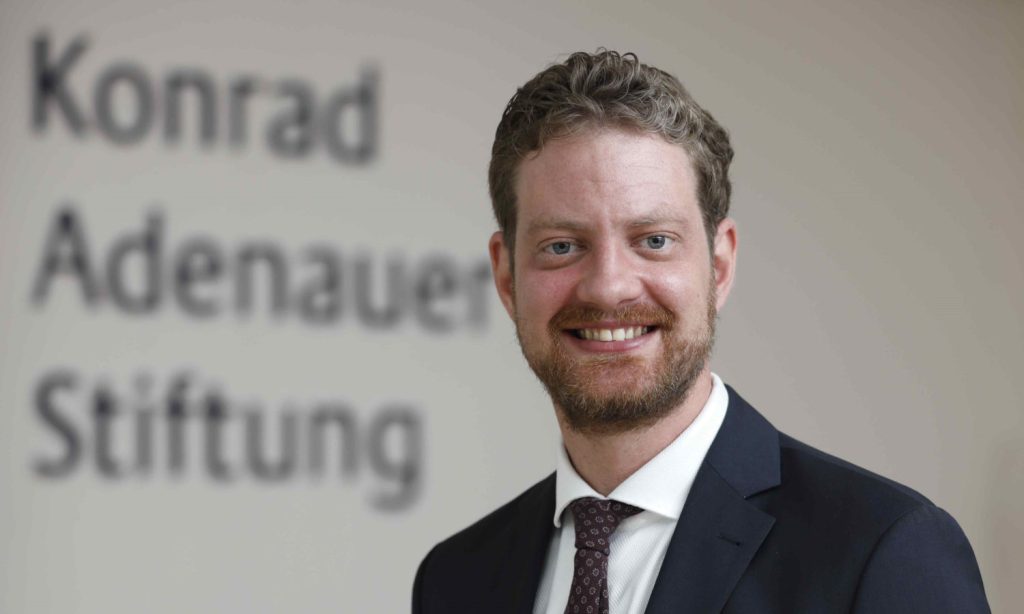
“It is our task to keep the political dialogue alive,” Johann Fuhrmann says about his work in China. Since July 2021, the 38-year-old is in charge of the office of the Konrad-Adenauer-Stiftung (KAS) in the Chinese capital. Earlier this year, he managed to enter the country and has since worked permanently on-site in Beijing again.
There, he mainly keeps in touch with universities and think tanks. He sometimes discusses Taiwan and the South China Sea. There are actually no taboo topics, says Fuhrmann. “In background discussions, things are presented in a much more differentiated way from the Chinese side.” That is why it is important for him to be on the ground in China.
His experience taught him that China was open to exchange. That surprised him positively, Fuhrmann says. “I really believe that there is a genuine interest in dialogue with Germany and Europe in China.”
However, his work in China has nothing to do with classic foundation or educational activities. Since 2017, NGOs and foundations must cooperate with a Chinese partner organization to be allowed to remain active at all.
Johann Fuhrmann experienced a time when things were quite different. Before his time in China, he managed the KAS office in Mongolia. One thing that appeals to him is to always work in new places: Fuhrmann studied in London and later became a trainee for KAS in Moscow. “But the career along the Trans-Siberian Railway was not planned this way,” he says.
In Mongolia, the KAS focuses on the “promotion of democracy in the very classical sense.” Among other things, the foundation has set up the “Journalism and Politics” academic course there. “In the end, I was invited to lunch with the state president,” says Fuhrmann. That will probably not happen in China any time soon.
This leaves more time for research. In China, for example, the KAS publishes the “Monitor Entwicklungspolitik” – a series of publications dedicated to the role of non-traditional donor countries in development cooperation. Accordingly, China is definitely competing with the United States in terms of global development aid.
To this end, Beijing has set up the Asian Infrastructure Investment Bank (AIIB), among others. “For China, this is an instrument to establish itself as a serious and responsible player in the world,” says Fuhrmann.
This also includes Chinese investments in Europe, such as a loan to Hungary. Fuhrmann sees this as an attempt to play European institutions off against each other – in order to be taken seriously. He believes that Europe needs to speak more “with one voice.” Jana Hemmersmeier
Peter Willemsen will become COO at Chinese battery cell manufacturer Gotion Global. The Volkswagen supplier, which maintains offices in Silicon Valley and Shanghai, is currently rolling out additional production facilities in Germany, Vietnam and the USA. Willemsen is the former China Head of Rheinmetall Automotive. He previously served in China, for example, at automotive suppliers like Continental AG and Hella Electronics. He is based in Shanghai.
Kaan Karakaya has taken over the post of Head of Service China at Rena Technologies. The German mechanical engineering company specializes in equipment for wet-chemical surface treatment in the semiconductor, medical, solar and glass industries. Karakaya has been working for Rena in China since 2019. Most recently, he worked for the company in Shanghai as senior service manager.
Is something changing in your organization? Why not let us know at heads@table.media!

During the construction boom of recent years, numerous spectacular buildings have sprung up in China – such as a skyscraper in the shape of Daoist deities and a museum designed like a teapot. In 2014, Xi Jinping had already opposed such “strange, oversized architecture.” A ban eventually followed last year. However, the ban apparently does not apply to cute art on buildings, as is demonstrated by this panda construction in Nanning in Guangxi province.
Michelle Bachelet’s Xinjiang report, which was presented a month ago, should have resulted in substantial consequences. After all, it provided detailed circumstantial evidence pointing to “crimes against humanity” by the Chinese government. But the UN Human Rights Council is divided. In the best scenario, the Council will next week decide on an in-depth debate on the report for 2023.
But at least, if this motion is adopted, the way could be paved for the first resolution against China in the history of the Human Rights Council. If the motion fails, China would have weathered the first storm of worldwide outrage after the UN indictment – at least at the UN level. But the initiators remain confident, Marcel Grzanna has learned.
It is practically certain that Xi Jinping will remain the head of state after the CP Congress. But what about his entourage? The candidates for a generational change in the Party are already in the starting blocks. Top positions such as Vice President and Prime Minister will have to be filled. The big question in the fight for the top positions is: Are only Xi allies next in line, or will he have to make compromises with other factions? Read more about the top candidates and a potential future successor to Xi Jinping after his third term in office in Christiane Kuehl’s analysis.
Shortly before the CP Congress, the reins are also being tightened once again in the art and culture industry. Even though the elections in China are not democratic, the government pays close attention to the messages that make the rounds before important political events. And so, a movie that was initially praised by the state media as a “homage to simple country life” fell victim to the censorship authorities this week. “Return to Dust” by director Li Ruijun, which has also been celebrated in Europe, gives a true-to-life description of life in China’s countryside – and thus of the longing of the local population for a better life. However, since Xi has already “defeated extreme poverty” in China at the beginning of 2021, nothing to the contrary can be allowed on the big screen.


Who are Wang Yang, Wang Huning, Hu Chunhua or Chen Min’er? Never heard of them? That may be because China’s political system currently revolves mainly around Xi Jinping – state and party leader for the last ten years and who knows, maybe the next ten or more. The four mentioned above rank among the most promising contenders for top posts in the Communist Party after the congress on October 16. Xi may have passed both the unofficial age limit and the unofficial two-term limit for party posts. But these are only unofficial, after all, and so it is considered certain that the CP congress delegates will grant Xi a third term. Whether other top cadres in Xi’s entourage will keep their seats, however, is far less clear.
Observers generally expect a generational change from the Central Committee upward. This change has already taken place in the party organs of the provinces and municipalities. But who will take which post is more unclear to outsiders than it has been for a long time. Sinologist Klaus Muehlhahn, President of Zeppelin University in Friedrichshafen, suspects that there has been fierce trench warfare within the party over the various posts (China.Table reported).
The 69-year-old Xi heads the Politburo Standing Committee, the CP’s closest power circle. The others are currently – in hierarchical order – Premier Li Keqiang (67), chief of the National People’s Congress (NPC) Li Zhanshu (72), Political Consultative Conference Chairman Wang Yang (67), ideology czar Wang Huning (67), Central Commission for Discipline Inspection Head Zhao Leji (65) and Vice Premier Han Zheng (68). They all belong to the so-called Fifth Generation of the CP.
According to the unofficial “seven up, eight down” rule (七上八下), only cadres who are 67 years old and younger at the time of the CP congress may remain in office. After 68 they have to retire. Actually, Li Zhanshu and Han Zheng would have to leave the Standing Committee alongside Xi. Since he will remain in office, two top positions will be up for grabs. Half of the members of the 25-member Politburo are likely to be replaced.
The big question: Will only Xi’s allies have a chance, or does the strongman have to make compromises with other factions? Xi has only recently cleaned up the security apparatus with the help of a wave of indictments, mainly for corruption, and filled the vacant posts with loyal followers (China.Table reported) – an ominous sign.
The party congress appointments also provide clues to the changes in state offices to be determined at the NPC in March 2023. In particular, the vice president, the prime minister, and his deputy are to be newly appointed. Premier Li Keqiang stressed in March that he is now serving his last year in office. It is also certain that Vice President Wang Qishan will retire in March 2023 – he is over 70. No clear favorites are known for either post.
Xi could, according to some observers, appoint his confidant and experienced economic policymaker Liu He as vice president. Liu, a Harvard-educated economist, headed, among other things, the negotiations in the trade war with the United States. He is considered the brains behind many economic reforms. The problem: Liu is already 70 years old (born in 1952). But who knows? Wang Qishan was also 69 when Xi appointed him vice president in 2017 – from the position of vice premier, as would be the case with Liu He now.

Under Xi’s predecessors, the vice president has also been the crown prince for the succession of the leader: Xi himself served as vice president to his predecessor Hu Jintao. Liu He as vice president would therefore be a sign that Xi is in no way thinking about retiring, not even after 2027. Meanwhile, a younger candidate for the job does not really stand out. So we will have to wait and see.
If Xi followed the rules, Premier Li Keqiang would be allowed to stay on the Standing Committee and he himself would not. Instead, it is the other way around. But who will succeed Li as premier to rescue China’s stumbling economy? Two top candidates are Wang Yang and Vice Premier Hu Chunhua. Both Wang and Hu have led the boom province of Guangdong as party chiefs and are considered comparatively pragmatic, reform-minded politicians. Both fulfill the key requirement of (previously) serving as vice-premier. Hu is now, Wang was from 2013 to 2018.


If either of them gets the post, it would be a clear sign that Xi cannot push through all personnel decisions. After all, like Li Keqiang and Xi’s own predecessor Hu Jintao, both belong to the so-called Youth League faction of the CP – which is not said to consist of staunch Xi loyalists, even though Wang Yang, according to a report in the Japanese newspaper Nikkei Asia, has lately been emphatically pro-Xi. Either way, their scope for major change could be limited under the more state-driven “Xiconomics” model, political insiders told Reuters.
Other possible candidates for the post of prime minister are the party leader of Chongqing, Chen Min’er, and his Shanghai counterpart Li Qiang. Both are considered Xi loyalists. Li Qiang was Xi’s secretary for three years when Xi was party chief in the province of Zhejiang. But it is unclear whether he will politically survive the chaos of the Shanghai Covid lockdown.
There are also several candidates for the two likely vacant seats on the Standing Committee, all of them male. “Several 6G leaders — for example, Director of the CCP General Office Ding Xuexiang (1962), Vice Premier Hu Chunhua (1963), and Chongqing Party Secretary Chen Min’er (1960) — will be top contenders for the seven-member Politburo Standing Committee (PSC),” expects Cheng Li, Director of the Brookings Institution’s John L. Thornton China Center in Washington.

Ding and Chen are Xi protégés. Shanghai’s Li Qiang, as well as party leader Cai Qi, are also repeatedly mentioned. If he moves up, Hu Chunhua could be the only one on the Standing Committee who is not one of Xi’s henchmen.
There is also room for rising the ranks within the Standing Committee. For example, Xi’s confidant Wang Huning is considered a candidate for a higher calling. As head of the Central Secretariat, he is in charge of ideology. Since the higher-ranking NPC Chief Li Zhanshu is likely to retire, Wang would be in line for his post – or for the chairmanship of the Consultative Conference.

Meanwhile, a successor for Xi is not in sight. Ten years ago, Chen Min’er had been considered a possible successor. But if Xi remains in office for another ten years, 59-year-old Chen will end up being too old for that. Xi will “effectively rule China for another 10-15 years,” believes Yang Zhang, a CP expert and sociologist at American University in Washington. “For now, he does not need to appoint a successor, and nobody dares to propose one. His future successor is now a middle-rank official.” Perhaps China observers should start keeping an eye on the seventh generation.
This Wednesday morning, the proponents of document A/HRC/51/L.6 will meet for a final informal consultation. In Room XXI/Webex at the United Nations in Geneva, the UK has invited the existing signatories to a draft decision that is considered a litmus test of the balance of power in the Human Rights Council. The main question is: Is the UN body in principle willing to take action following last month’s Xinjiang report by High Commissioner Bachelet?
In theory, nothing seems more logical than that. After all, the report gave detailed proof and circumstantial evidence pointing to “crimes against humanity.” But in practice, the Human Rights Council is divided on whether torture, forced labor, and internment of millions of Uyghurs in Xinjiang is a purely Chinese issue.
The paper that addresses this issue falls short of calling for concrete action. Instead, it formulates a decision “to hold a debate on the situation of human rights in the Xinjiang Uyghur Autonomous region, at its fifty-second session under Item 2.” The 52nd session begins in February 2023, and proponents of the paper are trying to buy time to win a possible vote on tangible consequences.
The affected Uyghurs, human rights organizations and members of the independent expert commission had already hoped for a resolution. “Now this report is up-to-date. That is why now there is the greatest chance that decisions will be made that can immediately help the Uyghurs in Xinjiang,” said Zumretay Arkin, who traveled to Geneva as a spokesperson and lobbyist for the World Uyghur Congress (WUC).
But the initiators stress that they want to avoid an escalation in the Council at this point and instead give all member countries time to deal closely with the UN report. The report was published less than two weeks before the start of the 51st session. So there will definitely be no decision on possible consequences of the Xinjiang report before next year.
A so-called China mechanism is being discussed. This would involve the appointment of a special UN rapporteur for human rights crimes in the People’s Republic of China. To date, there are eleven of these, for example for Syria, Afghanistan, North Korea and Eritrea. In addition, there are 44 thematic areas covered by special rapporteurs, but they are not limited to specific countries.
The High Commissioner’s Office also recognizes that the time is right. Last week, the acting head of the High Commission, Nada Al-Nashif, reportedly emphasized in a conversation with a delegation of the visiting Human Rights Committee in the German Bundestag that she considers decisive action by the international community to be imperative. However, Al-Nashif is only in office on an interim basis after her predecessor, Michelle Bachelet, decided at relatively short notice that she would not be available for another term. Her designated successor, Volker Tuerk, will not take up his post until mid-October.
In a statement, the EU joined the call “reporting to the Human Rights Council to closely monitor, report, and assess the human rights situation.” The latest documents confirmed the severity of the human rights situation in China, particularly in Xinjiang, Tibet and Inner Mongolia, the EU representation said.
A vote on the requested decision will be held next Thursday at the earliest, before the session closes after four weeks on October 7. If the motion is adopted, the 52nd session could see the People’s Republic of China become part of a human rights resolution as a member of the UN Security Council for the first time in the body’s 16-year history.
Should the motion fail, the People’s Republic would have weathered the first storm of worldwide outrage after the UN indictment without any repercussions – at least at the UN level. It would still be up to national governments and parliaments, but also the EU, to draw political consequences. However, confidence is high that the decision will be passed by the Council, otherwise, it would not be tabled, a European diplomat told China.Table.
As the second-largest economy, China has been increasingly gaining influence over individual nations and their voting behavior in UN bodies. In Geneva, too, negotiations have been going on behind the scenes since the beginning of the session to organize majorities, it is said. Germany is also part of the Council and is considered a supporter of the motion. However, neither Germany nor, for example, France have so far signed the motion for a decision as of Tuesday evening. A corresponding request to the German representation in Geneva remained unanswered for the time being.
Apart from the United Kingdom and the United States, only Canada, Denmark, Finland, Iceland, Norway and Sweden signed the document. However, the list is still open up to and including today. “We will continue to hold the PRC to account and call on the PRC to release those unjustly detained, account for those disappeared, and allow independent investigators full and unhindered access to Xinjiang,” the US said.
The US government officially labels human rights crimes in Xinjiang as genocide. According to UN conventions, an obligation under international law ensues. This was pointed out by former judge Sir Geoffrey Nice, who presided over the independent Uyghur tribunal in the UK between 2020 and the end of 2021. “The International Court of Justice says that recognition of genocide must be followed by immediate action to stop the crimes. The Americans could do much more,” Nice said at a press conference in Geneva the previous week.
For the general debate of the 51st session last Monday, the People’s Republic had flown in no less than three officials from Xinjiang to speak to the Council, despite all zero-Covid measures. Several members of the Council sounded the same horn. Malaysia, Indonesia or India, for example, supported China’s position and strongly conveyed that a possible approval of application A/HRC/51/L.6 will be a razor-thin affair at best.

The fact that “Return to Dust” (隐入尘烟) would ever be shown on China’S big screens at all is already a small miracle. The heavy movie, which tells the unconventional love story between an impoverished farmer and a woman with a physical disability, has all the characteristics that scare off mainstream audiences in the People’s Republic and call the censorship authorities to action: a low budget, static camera angles and a social critique that is hard to take in.
What was less surprising was that the work by director Li Ruijun initially wowed international cineastes, including during its world premiere at the Berlinale in February. But contrary to all predictions, “Return to Dust” also became a hit with the Chinese audience, where commercial blockbusters and propaganda usually dominate: By mid-September, the film had already grossed over ¥100 million, the equivalent of almost €15 million.
But then the censors got nervous: First, they pulled Return to Dust from the official cinema program. And as if that had not been enough, they pulled the movie from all streaming services on Monday – without any explanation. This is especially cynical considering that the movie itself was once rewarded by the “People’s Newspaper” – after all, the official organ of the Communist Party – with a favorable review and praised as a “homage to simple country life“.
And it was precisely this documentary authenticity that struck a chord with Chinese cinema audiences. Director Li made his entire cast work on a farm in the northwestern Chinese wilderness of Gansu for an entire year in order to learn the local dialects, the economically backward everyday life and the harsh climate. Anything else, the director said in an interview a few months ago, would have felt like a betrayal of the community in which he himself grew up.
The 39-year-old knows poverty first-hand. His home village was not even connected to the power grid until the 1990s. But with electricity came a passion for TV movies, which fueled his desire to escape the barren landscape of China’s northwest.
And because his artistic talent was recognized early on, Li actually landed a traineeship at the National Broadcasting Authority in Beijing, where young Li was suddenly confronted with a completely new world. He downright absorbed the movies of the French “Nouvelle Vague” and fell in love with the “Neorealism” of Italian directors. One particular masterpiece by Vittorio de Sica would leave a lasting impression on him: “Bicycle Thieves” from 1948, which was filmed in the streets of Rome, told the story of ordinary people, and partly had no professional actors.
Li adapted this method for his own films, all of which tell of the troubles and hardships, but also the desires and passions, of ordinary people.
That his artistic voice is now silenced in his homeland saddens many Chinese. “It’s a real shame,” says one user on the online platform Weibo. Another writes resignedly: “That such a sensitive movie can simply be deleted…. It seems as if there really is no hope left here.” Carlo Chatrian, Artistic Director of the Berlinale, also expressed his disappointment about the censorship measure on Twitter.
But in the Chinese government’s bizarre logic, this move is quite consistent. President Xi Jinping presents himself as a man of the people who is committed to fighting poverty in the provinces. At the same time, however, he demands that his people see as little as possible of these social problems. According to Xi, the arts should spread “positive energies” and “harmonize” the people. The official state narrative considers “extreme poverty” in China “defeated” since the beginning of 2021, all thanks to government measures. Consequently, it is not allowed to be portrayed in works such as Return to Dust.
How little respect the censorship authorities have for artistic freedom already became apparent several months ago: Because even before “Return to Dust” was completely banned, they had already altered the film’s depressing ending into a classic “happy ending”. A text added to the end credits stated that the impoverished protagonist managed – with the help of the government – to move from his run-down farmhouse into a modern apartment. Fabian Kretschmer


Sinolytics is a European research-based consultancy entirely focused on China. It advises European companies on their strategic orientation and concrete business activities in the People’s Republic.
Beijing has extended the exemption from the purchase tax for EVs. The tax exemption will also apply for the entire year 2023, the government recently announced. The date of purchase will be based on the date of issuance of valid documents for the vehicle. As is already the case, the exemption is to apply to battery-powered electric cars, plug-in hybrids as well as fuel cell vehicles. The models are included in a catalog published by the IT Ministry. The tax exemption will automatically continue in 2023 for cars included in this catalog before December 31, 2022.
Normally, car purchases are subject to a purchase tax of ten percent of the price, but currently only five percent thanks to an economic stimulus package. EVs were exempt – a subsidy that was supposed to expire in 2021.
But China’s economy is flagging, and EVs are needed to boost China’s overall ailing car market. In August, more than 600,000 NEVs were sold for the first time: Battery-powered EVs accounted for by far the largest share, with 490,000 models sold. “Compared to July 2022, 632,000 electric cars sold represent an increase of around twelve percent, and compared to the same month last year, sales of NEV passenger cars more than doubled (+108%),” the news service Electrive wrote. ck
Troubled real estate developer Evergrande is working with the Shenzhen government to finish several construction projects in the city that had to be put on hold due to payment difficulties. According to a joint statement released on Tuesday by Evergrande and the city-owned real estate investment company Longgang Ancheng Investment Operation Co Ltd, the two companies will finish four projects in the Longgang district to ensure house buyers will receive their homes.
Due to outstanding debt of more than $300 billion, Evergrande had to suspend construction on numerous projects planned and already underway. The company announced this month that 38 of 706 Evergrande projects are on hold. Because construction of their homes had been delayed, tens of thousands of Chinese buyers had threatened to stop paying their mortgages in July (China.Table reported).
The state-owned China Construction Bank (CCB) also announced on Friday the creation of a ¥30 billion fund to finance rental housing. The bank plans to provide the money itself, which will be invested in real estate projects to convert them into affordable rental housing.
Evergrande is not the only heavily indebted real estate group in the country. This week, real estate developer Shanghai Shimao Co declared that the repayment of a ¥1 billion bond due on October 21 is uncertain. The company will negotiate with bondholders to reach an agreement on the repayment of the bond, it said in a statement Tuesday. rtr/fpe
Facebook parent company Meta Platforms announced the takedown of a Chinese network. The network operated fake accounts on Meta’s social media platforms Facebook and Instagram, as well as on rival service Twitter, Meta announced on Tuesday. The company said it is the first time a Chinese operation targeted users ahead of the US midterm elections in November. While the network is small and does not have many followers, the discovery is significant, as it points to more direct interference in US domestic politics than previously attempted by Russia.
The fake accounts posed as liberal and conservative Americans in various states, according to Meta, and posted memes and comments under posts made by public figures since November 2021. An example screenshot shows an account commenting on a Facebook post by Republican Senator Marco Rubio calling on him to stop gun violence. The same network also set up fake accounts posing as people in the Czech Republic – criticizing the Czech government for its China policy, the report says. For example, a delegation from the Czech Republic had recently visited Taiwan. At the same time, Meta had uncovered a large network of fake Russian accounts, which allegedly targeted Germany and other European countries in particular. rtr/ck

“It is our task to keep the political dialogue alive,” Johann Fuhrmann says about his work in China. Since July 2021, the 38-year-old is in charge of the office of the Konrad-Adenauer-Stiftung (KAS) in the Chinese capital. Earlier this year, he managed to enter the country and has since worked permanently on-site in Beijing again.
There, he mainly keeps in touch with universities and think tanks. He sometimes discusses Taiwan and the South China Sea. There are actually no taboo topics, says Fuhrmann. “In background discussions, things are presented in a much more differentiated way from the Chinese side.” That is why it is important for him to be on the ground in China.
His experience taught him that China was open to exchange. That surprised him positively, Fuhrmann says. “I really believe that there is a genuine interest in dialogue with Germany and Europe in China.”
However, his work in China has nothing to do with classic foundation or educational activities. Since 2017, NGOs and foundations must cooperate with a Chinese partner organization to be allowed to remain active at all.
Johann Fuhrmann experienced a time when things were quite different. Before his time in China, he managed the KAS office in Mongolia. One thing that appeals to him is to always work in new places: Fuhrmann studied in London and later became a trainee for KAS in Moscow. “But the career along the Trans-Siberian Railway was not planned this way,” he says.
In Mongolia, the KAS focuses on the “promotion of democracy in the very classical sense.” Among other things, the foundation has set up the “Journalism and Politics” academic course there. “In the end, I was invited to lunch with the state president,” says Fuhrmann. That will probably not happen in China any time soon.
This leaves more time for research. In China, for example, the KAS publishes the “Monitor Entwicklungspolitik” – a series of publications dedicated to the role of non-traditional donor countries in development cooperation. Accordingly, China is definitely competing with the United States in terms of global development aid.
To this end, Beijing has set up the Asian Infrastructure Investment Bank (AIIB), among others. “For China, this is an instrument to establish itself as a serious and responsible player in the world,” says Fuhrmann.
This also includes Chinese investments in Europe, such as a loan to Hungary. Fuhrmann sees this as an attempt to play European institutions off against each other – in order to be taken seriously. He believes that Europe needs to speak more “with one voice.” Jana Hemmersmeier
Peter Willemsen will become COO at Chinese battery cell manufacturer Gotion Global. The Volkswagen supplier, which maintains offices in Silicon Valley and Shanghai, is currently rolling out additional production facilities in Germany, Vietnam and the USA. Willemsen is the former China Head of Rheinmetall Automotive. He previously served in China, for example, at automotive suppliers like Continental AG and Hella Electronics. He is based in Shanghai.
Kaan Karakaya has taken over the post of Head of Service China at Rena Technologies. The German mechanical engineering company specializes in equipment for wet-chemical surface treatment in the semiconductor, medical, solar and glass industries. Karakaya has been working for Rena in China since 2019. Most recently, he worked for the company in Shanghai as senior service manager.
Is something changing in your organization? Why not let us know at heads@table.media!

During the construction boom of recent years, numerous spectacular buildings have sprung up in China – such as a skyscraper in the shape of Daoist deities and a museum designed like a teapot. In 2014, Xi Jinping had already opposed such “strange, oversized architecture.” A ban eventually followed last year. However, the ban apparently does not apply to cute art on buildings, as is demonstrated by this panda construction in Nanning in Guangxi province.
